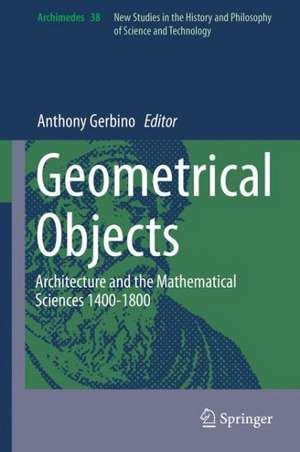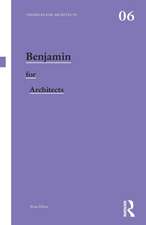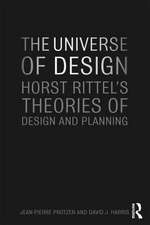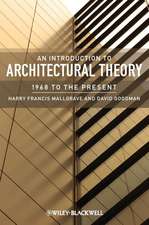Geometrical Objects: Architecture and the Mathematical Sciences 1400-1800: Archimedes, cartea 38
Editat de Anthony Gerbinoen Limba Engleză Hardback – 5 aug 2014
| Toate formatele și edițiile | Preț | Express |
|---|---|---|
| Paperback (1) | 1000.70 lei 6-8 săpt. | |
| Springer International Publishing – 17 sep 2016 | 1000.70 lei 6-8 săpt. | |
| Hardback (1) | 1006.87 lei 6-8 săpt. | |
| Springer International Publishing – 5 aug 2014 | 1006.87 lei 6-8 săpt. |
Din seria Archimedes
- 5%
 Preț: 909.01 lei
Preț: 909.01 lei - 18%
 Preț: 899.21 lei
Preț: 899.21 lei - 18%
 Preț: 785.55 lei
Preț: 785.55 lei -
 Preț: 382.36 lei
Preț: 382.36 lei - 18%
 Preț: 1833.33 lei
Preț: 1833.33 lei - 15%
 Preț: 643.84 lei
Preț: 643.84 lei - 18%
 Preț: 951.77 lei
Preț: 951.77 lei - 15%
 Preț: 645.79 lei
Preț: 645.79 lei - 15%
 Preț: 644.30 lei
Preț: 644.30 lei - 20%
 Preț: 577.19 lei
Preț: 577.19 lei - 18%
 Preț: 1048.19 lei
Preț: 1048.19 lei - 15%
 Preț: 646.62 lei
Preț: 646.62 lei - 18%
 Preț: 1110.09 lei
Preț: 1110.09 lei - 18%
 Preț: 1211.25 lei
Preț: 1211.25 lei - 18%
 Preț: 730.02 lei
Preț: 730.02 lei - 18%
 Preț: 1546.82 lei
Preț: 1546.82 lei - 18%
 Preț: 891.48 lei
Preț: 891.48 lei - 18%
 Preț: 776.88 lei
Preț: 776.88 lei - 18%
 Preț: 1214.60 lei
Preț: 1214.60 lei - 18%
 Preț: 1113.26 lei
Preț: 1113.26 lei - 18%
 Preț: 777.69 lei
Preț: 777.69 lei - 18%
 Preț: 995.83 lei
Preț: 995.83 lei - 15%
 Preț: 635.47 lei
Preț: 635.47 lei - 24%
 Preț: 1459.28 lei
Preț: 1459.28 lei - 18%
 Preț: 948.47 lei
Preț: 948.47 lei - 18%
 Preț: 1666.97 lei
Preț: 1666.97 lei - 18%
 Preț: 1114.83 lei
Preț: 1114.83 lei - 15%
 Preț: 645.60 lei
Preț: 645.60 lei
Preț: 1006.87 lei
Preț vechi: 1227.88 lei
-18% Nou
Puncte Express: 1510
Preț estimativ în valută:
192.67€ • 206.03$ • 160.64£
192.67€ • 206.03$ • 160.64£
Carte tipărită la comandă
Livrare economică 17 aprilie-01 mai
Preluare comenzi: 021 569.72.76
Specificații
ISBN-13: 9783319059976
ISBN-10: 3319059971
Pagini: 332
Ilustrații: XIV, 318 p. 148 illus., 43 illus. in color.
Dimensiuni: 155 x 235 x 27 mm
Greutate: 0.64 kg
Ediția:2014
Editura: Springer International Publishing
Colecția Springer
Seria Archimedes
Locul publicării:Cham, Switzerland
ISBN-10: 3319059971
Pagini: 332
Ilustrații: XIV, 318 p. 148 illus., 43 illus. in color.
Dimensiuni: 155 x 235 x 27 mm
Greutate: 0.64 kg
Ediția:2014
Editura: Springer International Publishing
Colecția Springer
Seria Archimedes
Locul publicării:Cham, Switzerland
Public țintă
ResearchCuprins
Introduction.- Proportion and Continuous Variation in Vitruvius’s De Architectura.- The Palazzo Del Podestà in Bologna: Precision and Tolerance in a Building all’Antica.- Practical Mathematics in the Drawings of Baldassarre Peruzzi and Antonio da Sangallo the Younger.- Geometric Survey and Urban Design: A Project for the Rome of Paul IV (1555–1559).- Architecture and Mathematics in Early Modern Religious Orders.- The Master of Painted Architecture: Andrea Pozzo, S. J. and His Treatise on Perspective.- Geometry, Mechanics, and Analysis in Architecture.- Epistemological Obstacles to the Analysis of Structures: Giovanni Bottari’s Aversion to a Mathematical Assessment of Saint-Peter’s Dome (1743).- Scientific Concepts of Beauty in Architecture: Vitruvius Meets Descartes, Galileo and Newton.- Breathing Room: Calculating an Architecture of Air.- James “Athenian” Stuart and the Geometry of Setting Out.- Index.
Textul de pe ultima copertă
This volume explores the mathematical character of architectural practice in diverse pre- and early modern contexts. It takes an explicitly interdisciplinary approach, which unites scholarship in early modern architecture with recent work in the history of science, in particular, on the role of practice in the scientific revolution. As a contribution to architectural history, the volume contextualizes design and construction in terms of contemporary mathematical knowledge, attendant forms of mathematical practice, and relevant social distinctions between the mathematical professions. As a contribution to the history of science, the volume presents a series of micro-historical studies that highlight issues of process, materiality, and knowledge production in specific, situated, practical contexts. Our approach sees the designer’s studio, the stone-yard, the drawing floor, and construction site not merely as places where the architectural object takes shape, but where mathematical knowledge itself is deployed, exchanged, and amplified among various participants in the building process.
Caracteristici
First edited collection specifically concerned with mathematical and architectural practice in the early modern period Provides a synthesis of both older and current scholarship, while also setting out an agenda for future research Genuinely interdisciplinary in both subject matter and approach Draws on original archival and documentary research Richly illustrated with photographs and original drawings, many never-before published Contributions by eminent scholars from North America and Europe Includes supplementary material: sn.pub/extras









